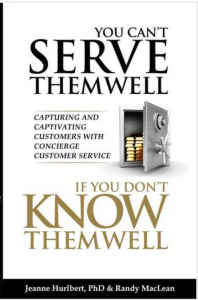
The objective in establishing Concierge Customer Service (CCS) is to deliver a differentiated, distinct, exceptional customer experience to your most profitable customers— and really good service to all customers—by giving customers more. In fact, the elements of Concierge Customer Service can be broken down as just that — M.O.R.E.: mindset, ownership, referability, and experience.
It means giving your customers more than your competitors give and often more than your customers expect. To maximize the conversion, penetration, and retention benefits of Concierge Customer Service, giving customers M.O.R.E. should become more than just policy—it must become part of your culture, something ingrained in your corporate DNA. Achieving that doesn’t require anything mysterious or magical. It’s primarily about executing the fundamentals, executing them well, and executing them consistently.
Let’s look more closely at what this really means. Certainly, most companies have a customer service department; but in wholesale distribution, the term “customer service” has become a code word for “order entry.” Because customer service representatives receive the orders, they’re also the people who talk to customers and are tasked with resolving customer problems and complaints. You may call that customer service, but that’s not Concierge Customer Service. Concierge Customer Service requires M.O.R.E.—a reality in which customer service means not just expedient ordering but also reliable problem resolution.
Concierge Customer Service is, by definition, EXTRAordinary, going “above and beyond” what is typical. In a 5-star hotel, you might receive such amenities as having your bags transported for you, being greeted throughout the hotel by your name at all times, and enjoying complimentary limousine service. The level of service that your most profitable customers receive should feel just as frictionless and extraordinary. Let’s look at the 4 key elements of Concierge Customer Service, the components of giving your customers M.O.R.E.
Mindset means that the people who own customer service in your organization need to be:
- Good listeners
- Patient
- Oriented towards solving problems rather than providing excuses
- Lifelong learners who embody a growth mindset rather than a fixed mindset, people who want to learn new things and learn how to put them into action.
This also requires that you, as the business leader, support CCS representatives in that learning process by providing, supporting, and rewarding learning and growth opportunities.
The Concierge Customer Service mindset entails being able to “take the role of other” easily and often, which means Concierge Customer Service representatives know how to gather details on a problem and find out what the customer wants. Their ability to understand well the customer’s point of view, taking notes to ensure that they do so, will prove critical to customer satisfaction, loyalty, and retention—and when you supplement it with a birds-eye view of customer preferences, through the Opportunity Generator, you increase both retention of customers and conversion of prospects. These individuals must embody the concept of a servant’s heart, which entails listening deeply to customers to understand who they are and what they need, so that they truly understand how to serve your customers.
Given these specific requirements and expectations, screening and hiring carefully becomes imperative. Assessments, such as the Kolbe A™ (which measures how individuals naturally take action) or the DiSC® profile can prove extremely useful. We highly recommend using detailed profiles interpreted by an experienced profiler to identify Customer Service Representatives (CSRs) and Concierge Customer Service Representatives (CCSRs) who will bring the right mindset to the positions.
Ownership means that those charged with Concierge Customer Service take ownership of customers’ problems, become advocates for the customer, and provide solutions, ensuring that they keep the customer apprised of each step through the process. One of the places in which we find many wholesale distribution companies falling short, in the eyes of their customers, is in their ability to advocate for customers when a problem arises. For your representatives to advocate successfully for the customer, you must fully support the CSR or CCSR within your organization, ensuring that she or he possesses the authority to solve problems and has clear avenues through which to get things done. That may mean that a CCSR can go directly to the warehouse to have something picked or that they can request a manager deliver what the customer needs.
As a mom I enjoyed a wonderful example of a company taking ownership of a problem: I ordered an item for my daughter, whose French class was taking a trip from south Louisiana to Canada—in the winter. One of the items I ordered was a sweater; but when the package arrived, I received not the wool sweater I had ordered but a lightweight cotton jacket that was no match for a Quebec winter. When I called the vendor, the customer service representative spent 30 minutes working to find the right substitute. Then she provided a 30% discount coupon and expedited shipping for the replacement item.
Referability: Imagine how motivated I was to tell other moms about this company, after that experience. This provides a wonderful example of how referability should follow automatically if the Concierge Customer Service process works well. When you provide an extraordinary experience, people will be ready, willing, and able to go generate new customers for you. This is true for two reasons. First, the “norm of reciprocity,” a fundamental principle of social life, demonstrates that when you give something to someone, they’re highly motivated to give you something in return. Second, when we find something exemplary—whether it’s a wonderful new restaurant or a business that provides extraordinary customer service—we’re immediately motivated to tell others about it. That’s why Concierge Customer Service makes you so referable. Those referrals are gold for your business because they let you reach deep into your target market at exceedingly low cost and practically clone your best customers.
Why is that the case? Because of a network principle called homophily. Simply put, the homophily principle means that we tend to be connected to others who are like us. So if one of your best, most profitable customers refers you to someone they know, the chances are good that the referral resembles closely the customer who generated the referral. The fundamental question you must ask yourself is: “Will your customers refer you or will they send others to your competitors?” The answer to that question is the ultimate measure of customer loyalty.
Experience: Providing an experience can be as simple as consistently executing the fundamentals—something many of your competitors probably fail to do. The Four Seasons Hotel seeks to “
Providing a meaningful experience to your customers means you must first understand what’s meaningful to them. What are their drivers? Are they focused on quality? Cost? Speed of delivery? Accuracy? Or must a meaningful experience embody all of these elements? To provide an experience that will delight your customers, you must first answer these questions. This is accomplished through the use of surveys.
When you select, train, and motivate your Concierge Customer Service representatives so that they embody these 4 elements of Concierge Customer Service, you differentiate your business immediately. Just think of the number of times you’ve experienced some kind of problem and had a customer service agent shuffle the problem off to another agent—or worse, try to foist the problem back on you.
When your Concierge Customer Service representatives respond to any problem by saying, “I’m so sorry this happened to you. I’m on it. Go back to your job, I’m going to take care of all of it, and I’m going to call you in a couple of hours and tell you how to solve your problem or I’ll tell you what’s going on,” you change the game in your business.
The key to your success lies in finding people who will make that happen because they have the right Mindset, they take Ownership consistently, they make you imminently Referable, and they provide an exceptional Experience. Then, make sure your employees implement the system as you intend, by ensuring their satisfaction, as well.
 This blog post is based off material from my book with Randy MacLean:
This blog post is based off material from my book with Randy MacLean:
“YOU CAN’T SERVE THEM WELL IF YOU DON’T KNOW THEM WELL: Capturing and Captivating Customers with Concierge Customer Service™”
You can get the first two chapters for FREE here.
If you’d like a full copy of the entire book, you can get it here.
 Dr. Jeanne Hurlbert, President of Hurlbert Consulting is an expert in sociology and survey research. After spending more than 25 years in academia, she now uses her extensive behavioral science expertise to help companies like yours distinguish yourselves through customer service. What sets her approach to customer service apart is that she begins by helping companies meld research and marketing to find out:
Dr. Jeanne Hurlbert, President of Hurlbert Consulting is an expert in sociology and survey research. After spending more than 25 years in academia, she now uses her extensive behavioral science expertise to help companies like yours distinguish yourselves through customer service. What sets her approach to customer service apart is that she begins by helping companies meld research and marketing to find out:
(a) exactly what their customers want and
(b) exactly how well they’re succeeding in giving customers what they want.
You can schedule a consult with her by going to www.ConciergeCustomerService.com; you can call her at 888-590-9677; or send an email here. And, if you’d like to complete her complimentary assessment to see how well you’re doing in knowing and serving your customers well, just go to www.FixYourService.com.





